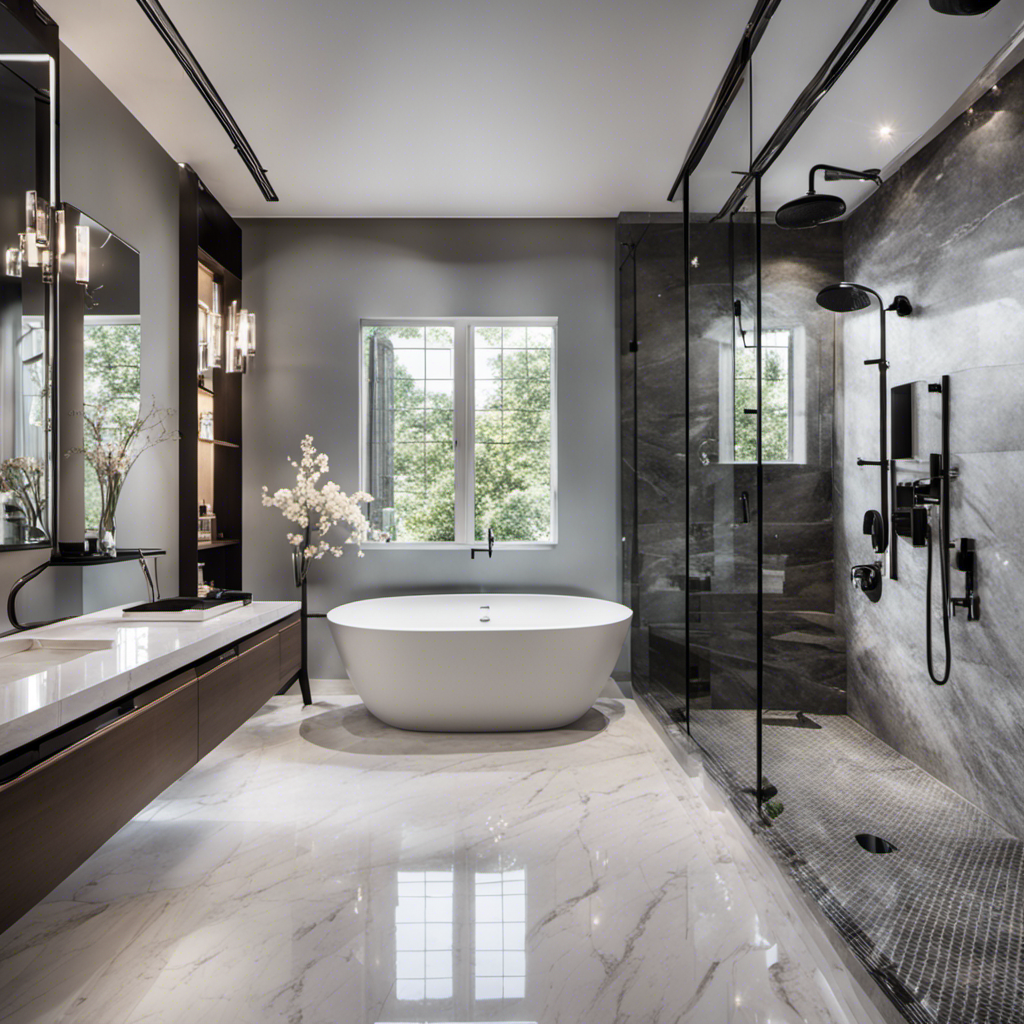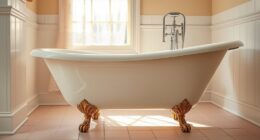Are you torn between choosing a tub or a shower for your bathroom? Well, let us help you make the best bathroom choice!
Picture this: you have a small bathroom space and a tight budget. In this scenario, a shower might be the ideal option for you. Not only does it save space, but it’s also generally more affordable.
However, if you have young children or pets, a tub is a necessity.
Join us as we explore the factors to consider, from personal preference to resale value, and help you make an informed decision.
Key Takeaways
- The size of the bathroom and the budget are important factors to consider when choosing between tubs and showers.
- Personal preference, family needs, and the safety of users also play a role in the decision.
- The presence or absence of a tub can affect the resale value of a house, as some buyers prefer houses with tubs.
- Tubs and showers offer a variety of styles and materials to choose from, catering to different tastes and preferences.
Bathroom Space and Budget
If you have a small bathroom and a limited budget, opting for a shower would be a better choice as it saves space and is generally more affordable.
When it comes to small bathroom design, showers take up less space compared to tubs. This leaves more free space in the bathroom, making it feel less cramped.
Additionally, showers are often more cost-effective options. Tubs can be available in different sizes, but showers are generally more space-saving.
While the size of the bathroom does affect the choice between tubs and showers, if you are looking for a cost-effective solution for a small bathroom, a shower is the way to go. Not only does it save space, but it also saves money.
Preference of Users
Young adults and the elderly prefer standing showers for their safety and ease of use. Here are some reasons why:
-
Safety: Standing showers provide a safer bathing experience for young adults and the elderly. The risk of slips and falls is significantly reduced compared to getting in and out of a tub.
-
Accessibility: Standing showers are easier to access for individuals with injuries or disabilities. There is no need to step over a high tub wall, making it more convenient for those with limited mobility.
-
Convenience: Showers offer a quick bathing solution with no waiting time. They are accessible to people of all ages and physical conditions.
-
Water efficiency: Showers use less water compared to tubs, saving on water consumption. On average, showers use around 2.1 gallons per minute, making them a more environmentally friendly option.
-
Relaxation: While tubs provide a relaxing bathing experience, showers are still favored by young adults for their convenience and ease of use.
Resale Value
Consider the resale value of your house when deciding between a tub or a shower. The presence or absence of a tub can have an impact on the property value and buyer preferences. People with young children and pets often prefer houses with tubs, as they provide a convenient bathing solution. Having at least one tub in the house is recommended for higher resale value, as it can be a selling point for potential buyers. However, it is important to note that buyer preferences may vary, and some individuals may prioritize a spacious, modern bathroom with a standing shower over a tub. Ultimately, the choice between a tub and a shower should be based on personal preference, family needs, and consideration of the impact on the resale value of your house.
| Impact on Property Value | Buyer Preferences | |
|---|---|---|
| Tubs | Can increase value | Preferred by families with young children and pets |
| Showers | Can decrease value | Preferred by individuals seeking a modern, spacious bathroom |
Variety of Styles and Materials
When it comes to designing your bathroom, explore the variety of styles and materials available for both tubs and showers. Here are some options to consider:
-
Tubs: Freestanding tubs add a touch of elegance to your bathroom, while clawfoot tubs offer a vintage charm. Acrylic tubs are lightweight and affordable, while enamel-coated cast iron tubs are durable and luxurious.
-
Showers: Walk-in showers provide a modern and sleek look, while enclosed showers offer privacy and a spa-like feel. Fiberglass showers are cost-effective and easy to maintain, while natural stone showers create a luxurious and sophisticated atmosphere.
Now, let’s discuss the pros and cons of different shower styles. Walk-in showers provide easy accessibility and a spacious feel, but they may require more cleaning. Enclosed showers offer privacy and a cozy ambiance, but they can make your bathroom feel smaller.
Consider your personal preferences and the overall look you want to achieve in your bathroom when deciding between tubs and showers.
Difficulties With Tub Accessibility
If you have limited mobility or are older, accessing a tub may pose challenges. The pros and cons of tub accessibility should be considered before making a decision.
One of the major advantages of tubs is the opportunity to relax and unwind in a bath. However, tubs can be difficult to access for individuals with mobility issues or injuries. This may require assistance or the use of specialized equipment.
On the other hand, showers offer convenience and quick bathing solutions. They are accessible to people of all ages and physical conditions. Showers also use less water and are more energy-efficient compared to tubs.
Alternative options for tub accessibility include installing grab bars, adding a transfer bench or seat, or considering walk-in tubs. It’s important to weigh these options and choose the one that best suits your needs and abilities.
Pros and Cons of Showers
One major advantage of showers is that they provide a quick and convenient bathing solution for individuals of all ages and physical conditions. Showers offer several benefits that make them a popular choice for many households.
Here are five key points to consider:
- Showers use less water compared to tubs, saving on water consumption.
- Energy efficiency is a benefit of showers, as less energy is required to heat the water.
- Showers leave more space in the bathroom, particularly in compact modern bathrooms.
- Showers provide a quick bathing solution with no waiting time.
- Installing a shower leaves more free space in the bathroom.
With their quick bathing solutions and energy efficiency, showers are an excellent choice for those looking for convenience and practicality in their daily routines.
Water and Energy Consumption
Now that you understand the pros and cons of showers, let’s explore the impact of water and energy consumption when deciding between tubs and showers.
When it comes to the environment, showers are the more sustainable option. Showers use less water, typically around 2.1 gallons per minute, compared to the larger volume needed for a tub. This not only helps conserve water but also reduces your water bill.
Additionally, showers require less energy to heat the water, making them more energy-efficient in the long run. By choosing a shower over a tub, you can contribute to a greener lifestyle while also enjoying long-term cost savings on your utility bills.
Installation and Repair Costs
When considering installation and repair costs, you’ll find that showers tend to be more expensive to install compared to tubs. Here are some pros and cons to keep in mind when it comes to tub repair and comparing the installation costs of showers and tubs:
-
Tub repair:
-
Pros: Repairing a tub can be cost-effective compared to replacing the entire unit. It can also help maintain the aesthetics of your bathroom.
-
Cons: Tub repairs can be time-consuming and may require professional assistance. Depending on the extent of the damage, the repair costs can add up.
-
Comparing installation costs of showers and tubs:
-
Showers: Installing a shower can be more expensive due to the need for plumbing and waterproofing. The cost may increase if you opt for custom features or materials.
-
Tubs: Installing a tub can be less expensive as it requires less plumbing work. However, the cost can vary depending on the type of tub and any additional features you choose.
Considering the pros and cons of tub repair and comparing the installation costs of showers and tubs will help you make an informed decision based on your budget and needs.
Considerations for Family Needs and Resale Value
Consider your family’s needs and the potential impact on the resale value of your home when deciding between tubs and showers.
Family needs and market value considerations play a crucial role in this decision-making process.
Tubs offer a relaxing experience, making them ideal for households with young children or pets. They can also be a selling point for potential buyers who prioritize having a tub in their home.
On the other hand, showers provide convenience and quick bathing solutions, which are preferred by young adults and the elderly. They are also more accessible for individuals with injuries or disabilities.
However, it’s important to note that the absence of a tub can impact the resale value of your home.
Ultimately, your personal preference, family needs, and the potential impact on market value should be taken into account when choosing between tubs and showers.
Frequently Asked Questions
How Do Tubs and Showers Affect the Overall Aesthetics of a Bathroom?
When considering the overall aesthetics of a bathroom, tubs and showers have different impacts. Tubs can add a touch of luxury and relaxation, while showers provide a sleek and modern look.
Are There Any Safety Features Available for Tubs and Showers?
Safety features for tubs and showers include grab bars, non-slip surfaces, and adjustable showerheads. Walk-in tubs provide easy access with built-in seats and handrails, while walk-in showers offer barrier-free entry and anti-scald systems.
Can Tubs and Showers Be Customized to Fit Specific Bathroom Dimensions?
Yes, tubs and showers can be customized to fit your specific bathroom dimensions. You can choose from a variety of sizes and styles to create the perfect bathing space that suits your needs and preferences.
What Are Some Popular Design Trends for Tubs and Showers?
Tubs and showers offer a variety of traditional and modern designs. For space-saving options, showers are generally preferred. Consider your bathroom dimensions and personal style when choosing between tubs and showers.
Are There Any Eco-Friendly Options Available for Tubs and Showers?
There are eco-friendly options available for tubs and showers. You can choose materials like bamboo or recycled glass for tubs, and install water-saving showerheads and faucets to minimize water consumption.
Conclusion
So, when it comes to choosing between a tub and a shower for your bathroom, there are a few key factors to consider.
First, think about the space you have available and your budget. Showers are a great space-saving option, while tubs can be more affordable.
Next, consider your personal preference and the needs of your family. Are you looking for convenience and quick bathing solutions, or do you need a tub for young children or pets?
Keep in mind that the presence or absence of a tub can also affect the resale value of your home.
Finally, consider the accessibility of tubs versus showers, as well as the pros and cons of each option. Showers offer convenience and energy efficiency, while tubs may pose challenges for older adults or people with disabilities.
With all of these factors in mind, you can make the best choice for your bathroom.










